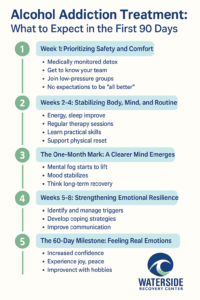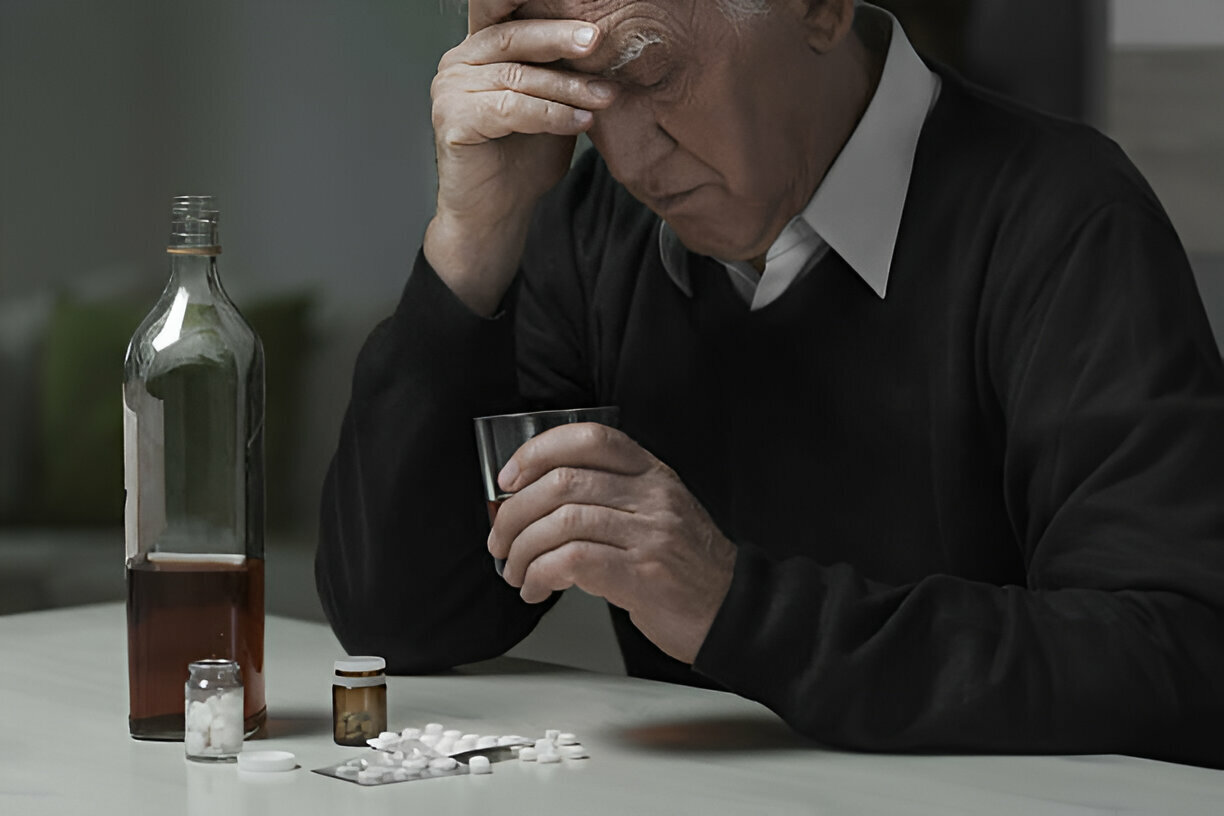Starting alcohol addiction treatment is a big decision, especially when it’s your first time. You may feel unsure—maybe even nervous about what’s going to happen. That’s normal. Many people come in with the same worries: Will it be overwhelming? Will I fail? What if it doesn’t work?
At Waterside Recovery’s alcohol addiction treatment program in Plymouth County, MA, we want you to know the first 90 days aren’t about pressure—they’re about relief. It’s a chance to feel safe, steady, and cared for while your body and mind recover from alcohol. Think of it like getting your footing on solid ground after being tossed around at sea.
Here’s what those first few months really look like, from a clinician’s view—not a sales pitch, just honest insight.
Week 1: Prioritizing Safety and Comfort
The first week focuses on getting you physically and emotionally stable. For many, this includes medically monitored detox. Our clinical team makes sure you’re comfortable and safe while your system clears alcohol. Detox isn’t about suffering—it’s about gentle, professional support so you can begin healing without risk.
Once you feel a bit more physically settled, you’ll:
- Get to know your treatment team.
- Learn about your schedule and what to expect day to day.
- Join low-pressure groups to start hearing others’ experiences.
In the first week, your only job is to be here. There’s no expectation to be “all better.” Just showing up is a win.
Weeks 2–4: Stabilizing Body, Mind, and Routine
In your second to fourth week, your energy slowly starts to return. Many people notice:
- Less physical discomfort.
- Clearer sleep patterns.
- Emotional ups and downs becoming more predictable.
This is where deeper healing starts. Therapy becomes more routine, including:
- Group therapy to share openly with others who understand.
- One-on-one counseling to explore the root causes of drinking.
- Practical skill-building: learning how to manage cravings, stress, and interpersonal challenges.
You’ll also begin exploring how your body feels sober. Regular meals, hydration, light physical activity—all of this supports your physical and emotional reset.
The One-Month Mark: A Clearer Mind Emerges
By the end of the first month, most people report their mental fog starts to lift. You might:
- Notice fewer mood swings.
- Feel more motivated to participate in groups.
- Start connecting with the idea of long-term recovery.
While you may still feel moments of doubt (totally normal), you’ll begin to experience brief stretches of calm you hadn’t felt in a long time. This is often when people realize: I don’t have to live in constant survival mode anymore.
Weeks 5–8: Strengthening Emotional Resilience
This period is when we guide you toward stronger emotional tools. Alcohol often masks feelings, so early sobriety can feel emotionally raw. That’s why we focus on:
- Identifying triggers and learning how to manage them without alcohol.
- Practicing coping techniques you can actually use in daily life.
- Developing communication strategies for healthier relationships.
In outpatient treatment programs like Waterside Recovery’s alcohol addiction treatment services, this phase often includes preparing for transitions—whether it’s returning to work, spending more time with family, or navigating social situations sober.
You’re learning how to stay steady in the world—not just within the safety of treatment.
The 60-Day Milestone: Feeling Real Emotions and Building Confidence
By around two months, many clients share that they feel more like themselves—but sometimes more emotionally sensitive. This is normal. Without alcohol numbing you, emotions feel sharper. But with therapeutic support, you learn:
- How to ride out uncomfortable emotions without falling apart.
- How to experience joy and peace without a chemical boost.
- That it’s possible to feel “normal” again—even if it’s a new kind of normal.
At this point, many clients also reconnect with old passions or discover new ones—hobbies, fitness, art, or simply enjoying quiet moments that used to feel impossible.

Weeks 9–12: Building a Sustainable Path Forward
By the final month of early treatment, the focus shifts to sustaining progress beyond the program. Your treatment team works with you to:
- Develop a customized aftercare plan (ongoing outpatient care, therapy, or support groups).
- Rebuild or strengthen personal support systems, like sober friends and family connections.
- Gain confidence in recognizing early warning signs of relapse and taking proactive steps.
Many people describe feeling more self-trust by this point. Sobriety no longer feels like something fragile—it feels like something that’s possible.
What If You Have Bad Days?
You will. Everyone does. But the difference is, you’ll have tools and people to lean on. Treatment is about progress, not perfection. You’ll learn how to forgive yourself quickly, get back on track, and move forward without letting one bad day undo weeks of good work.
Frequently Asked Questions (FAQs)
Is 90 days enough for alcohol addiction treatment?
The first 90 days are crucial for stabilization, but recovery is ongoing. Many people transition into outpatient care, sober living, or alumni programs after the initial phase. Long-term support increases the chances of lasting recovery.
What happens after 90 days?
You’ll work with your care team to decide next steps, which could include step-down care, continued outpatient therapy, or attending recovery groups like AA or SMART Recovery. Waterside Recovery helps you build a sustainable plan that fits your life.
Do I have to stop drinking forever after 90 days?
You’re not required to make forever decisions on day one. Treatment focuses on helping you live sober today—and teaches you how to make decisions that serve your health. Over time, most people find sobriety becomes a choice they want to make.
How will I know if treatment is working?
Progress shows up in small ways first: better sleep, clearer thinking, fewer regrets. Over time, your cravings decrease, relationships improve, and you feel more at peace. It’s not instant, but it’s noticeable.
What if I’ve tried before and it didn’t work?
That’s more common than you think. Many people need more than one attempt to achieve lasting sobriety. What matters is trying again—with the right support. Every attempt teaches you more about what you need.
The First 90 Days: Your Start, Not Your Finish
If you’ve been wondering what life could feel like without alcohol, the first 90 days of treatment give you a safe, supportive space to find out. No scare tactics. No shame. Just honest care and practical tools to help you start fresh.
Call (866)671-8620 to learn more about our alcohol addiction treatment services in Plymouth County, MA. Whether you feel ready or unsure, we’ll meet you where you are—one day at a time.


